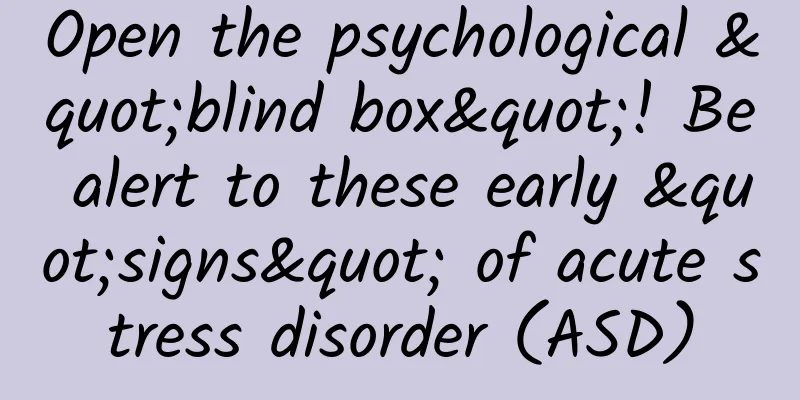Open the psychological "blind box"! Be alert to these early "signs" of acute stress disorder (ASD)

|
Acute stress disorder (ASD) refers to a short-term psychological abnormality that occurs within minutes or hours after suffering from acute and severe psychosocial stressors. The clinical symptoms are often manifested as a "dazed" state at first, that is, limited consciousness, misorientation, narrow attention, accompanied by purposeless movements, etc. They may then show signs of avoiding or withdrawing from the surrounding environment, manifested by being silent, motionless, refusing to eat or drink, and having no response to external stimuli; they may also show signs of agitation, excessive activity, and impulsive destructive behavior. At the same time, patients may show typical autonomic nervous system symptoms of anxiety, such as sweating, blushing, and increased heart rate. Patients sometimes cannot recall the traumatic event. The acute stress response generally lasts for several hours or days, with a good prognosis and complete symptom relief. Experts from the Second People's Hospital of Hunan Province (Hunan Brain Hospital) remind us that to identify whether we or others may have acute stress disorder (ASD), we can pay attention to the following key points: 1. Exposure to traumatic events Whether the individual has directly or indirectly experienced a traumatic event, such as a death threat, serious injury, or sexual assault. 2. When symptoms appear Symptoms of ASD typically begin within 3 days to 1 month after the traumatic event. 3. Specific symptoms Includes recurring, uncontrollable, intrusive, and distressing memories of the event, recurring distressing dreams about the event, a feeling that the traumatic event is replaying (e.g., in flashbacks), and intense psychological or physical distress when reminded of the event. 4. Emotional and cognitive responses People may experience a persistent inability to experience positive emotions (such as feelings of happiness, contentment, or love), an altered sense of reality (such as being in a daze or as if time has slowed down), loss of memory for important parts of the traumatic event, and efforts to avoid disturbing memories, thoughts, or feelings associated with the event. 5. Physiological and behavioral responses People with ASD may experience disturbed sleep, irritability or angry outbursts, excessive focus on the possibility of danger (hypervigilance), difficulty concentrating, and exaggerated reactions to loud noises, sudden movements, or other stimuli (startle reactions). 6. Impaired social function Symptoms must cause significant distress or significantly interfere with the individual's daily functioning. 7. Exclude other situations Doctors also check whether symptoms may be caused by medication use or other disorders to make sure the diagnosis of ASD is accurate. Hunan Medical Chat Special Author: Liu Zhiying, Hunan Second People's Hospital (Hunan Brain Hospital) Follow @湖南医聊 to get more health science information! (Edited by YT) |
<<: In order to grow taller, they actually "broke" their legs?
Recommend
6 "Excessive" Overdrafts for Women's Health
As a woman, have you ever paid attention to your ...
What to do if the cervix is sticky
For many women, factors that may damage the endom...
Is gynecological inflammation contagious?
When gynecological inflammation occurs, patients ...
Is it normal to have your period 10 days early?
Menstruation generally has a cycle of 28 days. It...
Reasons for discomfort in women
The lower part of a woman is what we often call t...
What to do if pregnant women have diarrhea
What should pregnant women do if they have diarrh...
Qingbitang: Don’t worry about rhinitis in winter, six methods can help you solve it easily!
Rhinitis refers to inflammation of the nasal muco...
What are the benefits of eating red dates for women?
Red dates have always been a kind of food that wo...
Diet therapy makes women healthier
1. Drink red wine to prevent and treat breast can...
The heat in the lower abdomen indicates implantation
During pregnancy, the body of a pregnant woman wi...
What are the symptoms of constipation in women
Many people are embarrassed to talk about their c...
What to do if the D2 polymer is high during pregnancy
We all know that pregnant women need to do a lot ...
【Popular Science Classroom】Understand the signs of schizophrenia and its prevention and treatment
...
Seven bad habits that completely disrupt women's menstruation
Menstrual disorders refer to abnormal changes in ...
Silent killer - hypertension in young people
Author: Yin Na, Beijing Hui Hospital Reviewer: He...









